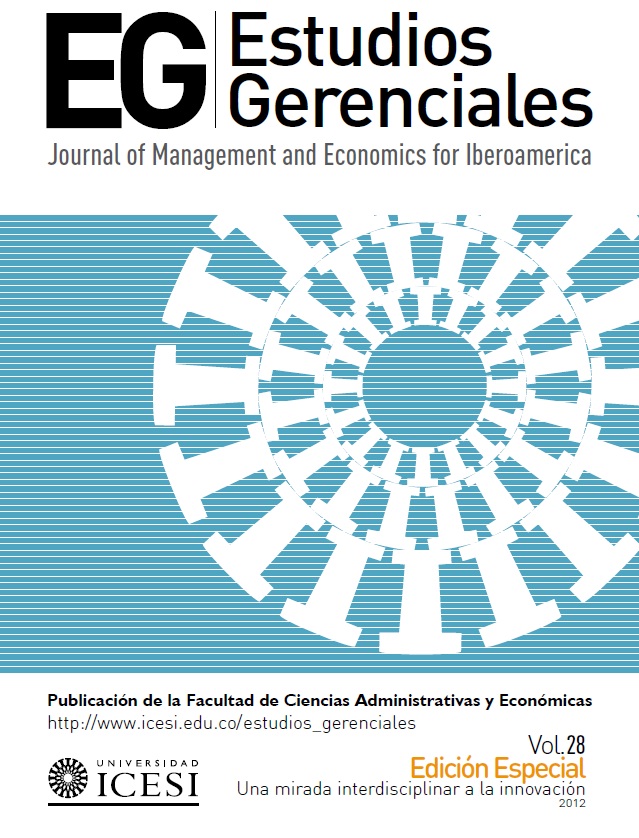El enfoque sistémico de la innovación: ventaja competitiva de las regiones
DOI:
https://doi.org/10.18046/j.estger.2012.1477Keywords:
Innovación sistémica, ecosistemas regionales, desarrollo holístico regional, ventaja competitiva de las regiones, ciudades innovadorasAbstract
Las empresas,eje del desarrollo económico,requieren de condiciones industriales, sociales y ambientales especiales para poder desarrollar su actividad en forma óptima.Si no existen estas condiciones adecuadas de región,no hay un desarrollo sostenido. Esto es evidente en países emergentes en donde no existen los elementos, ni la voluntad política ni empresarial para aprovechar el impacto de la innovación en el desarrollo económico,ambiental y social de estas regiones.En este documento se propone un mecanismo para replantear el impacto de la innovación sobre una actividad económica empresarial,el cual depende de la estructura de su ecosistema político
Downloads
References
Adler, P.S. (2001). Market hierarchy and trust: The knowledge economy and the future of capitalism. Organization Science, 12(2), 215-234.
Asheim, B.T. & Gertler, M. (2005). The Geography of Innovation: Regional Innovation Systems. En J. Fagerberg, D.C. Mowery & R.R. Nelson (Eds.), The Oxford Handbook of innovation (pp. 291-317). New York, NY: Oxford University Press.
Beer, S. (1985). Diagnosing the system for organizations. New York, NY: Wiley.
Carlsson, B., Jacobsson, S., Holménb, M. & Rickne, A. (2002). Innovation systems: analytical and methodological issues. Research Policy, 31(2), 233–245.
Cheng, P., Chong, J., Chen, S., Eldomiaty, T. & Millar, C. (2004). Knowledge repositories in knowledge cities: institutions, conventions and knowledge subnetworks. Journal of Knowledge Management, 8(5), 96-106.
Cooke, P. (2001). Regional innovation systems, clusters, and the knowledge economy. Industrial and Corporate Change, 10(4), 945–974.
Cooke, P. (2002). Knowledge Economies. Clusters, Learning and Cooperative Advantage. Londres/New York: Routledge.
Cooke, P. & Leydesdorff, L. (2006). Regional development in the knowledge-based economy: the construction of advantages. Journal of Technology Transfer, 31(1), 5-15.
Cooke, P., Urange, M.G. & Extebarria, E. (1997). Regional innovation systems: institutional and organizational dimensions. Research Policy, 4(5), 475–493.
Florida, R. (2010). The Great Reset. New York, NY: Harper Collins Publishers.
Florida, R. & Gates, G. (2004). Technology and Tolerance: The Importance of Diversity to high-technology Growth. En T.N. Clark (Ed.), The City as an Entertainment Machine (pp. 199–219). London: JAI.
Florida, R., Mellander, C. & Stolarick, K. (2008). Inside the Black Box of Regional Development – Human Capital, the Creative Class and Tolerance. Journal of Economic Geography, 8(5), 615-649.
Hospers, G.-J. (2003). Creative cities: breeding places on the knowledge economy. Knowledge, Technology, and Policy, 16(3), 143–172.
Kim, W.C. & Mauborgne, R. (1999). Creating the new market space. Harvard Business Review, 77(1), 83–93.
Luque, E. (2001). Whose knowledge economy?. Social Epistemology, 15(3), 187–200.
Munroe, T. & Westwind, M. (2008). Silicon Valley: The Ecology of Innovation. Malaga, España: Euromedia Comunicación.
Powell, W.W. & Snellman, K. (2004). The knowledge economy. Annual Review of Sociology, 30, 199-220.
Scheel, C. (2011), Innovacities: in search of breakthrough innovations producing world-class performance. International Journal of Knowledge-based development. 2(4), 372-388.
Senge, P., Smith, B., Kruschwitz, N., Laur, J. & Schley, S. (2008). The necessary revolution: How Individuals and Organizations Are Working Together to Create a Sustainable World. New York, NY: Knopf Doubleday.
Downloads
Published
Issue
Section
License
Articles are the sole responsibility of their authors, and will not compromise Icesi’s University principles or policies nor those of the Editorial Board of the journal Estudios Gerenciales. Authors authorize and accept the transfer of all rights to the journal, both for its print and electronic publication. After an article is published, it may be reproduced without previous permission of the author or the journal but the author(s), year, title, volume, number and range of pages of the publication must be mentioned. In addition, Estudios Gerenciales must be mentioned as the source (please, refrain from using Revista Estudios Gerenciales).








